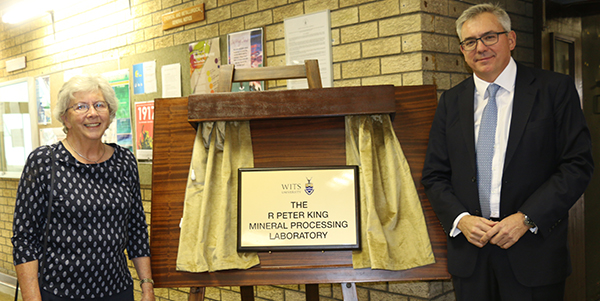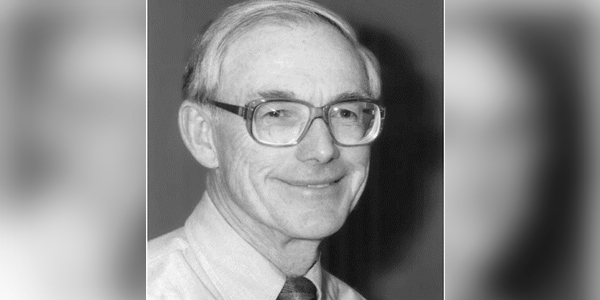A great teacher who inspired the average student
- Wits University
A new laboratory honours the late Professor Peter King, admired for his rapport with students and for pioneering work in metallurgical engineering.

A new laboratory honours the late Professor Peter King, admired for his rapport with students and for pioneering work in metallurgical engineering.
The School of Chemical & Metallurgical Engineering held a ceremony to mark the naming of the Peter King Minerals Processing Laboratory in recogniton King’s contribution to the mathematical modelling of minerals processing.
A Wits alumnus, King was an accomplished metallurgist who served as the head of the Department of Metallurgy and Materials Engineering for over a decade from 1976 to 1990 before accepting an appointment at the University of Utah.
The ceremony was attended by industry, King’s former students, and guests of honour, his wife, Ellen and son, Andrew.
Wits Professor Sehliselo Ndlovu and President of the South African Institute of Mining Metallurgy said the laboratory would ensure the continuation of King’s vision, who was passionate about capacity building and world-renowned for developing useful techniques to quantify mineral liberation.
Metallurgy is key to our economy. For more than 100 years, metallurgy at Wits has been inextricably linked to that of the mining industry said Ndlovu.
“Extractive metallurgy plays a critical in role maximising returns from the processing of mineral resources such as gold, platinum, coal, etc.”
A well-equipped laboratory for teaching and research is essential to continue producing experts in minerals processing.
Former students described King as a great teacher who instilled confidence and a desire for continual progress, especially among the average students.
The Wits graduates who hold key positions reflected on King’s flair with technology. King was among the first to incorporate technology in his teaching methods and provide online courses in response to the modern world.
An all-rounder, professional staff also praised King for his hands-on approach and open door policy.
Bruce Mothibedi, a senior technician at Wits, recalls many moments when King would don an overall to lend a hand in some of the messy pilot plant projects.
“Rarely do you find a man of Prof. King’s calibre sacrificing his time to lend a hand in plant processes, but he gladly did it. Staff development across different grades was also important to him and he would arrange appropriate training for his team, be it at industry, the mines or related fields, so that one could gain more understanding and passion for their work,” says Mothibedi.
King, who was born in Springs in 1938, left Wits and South Africa in 1990 to take up the post in Utah. His involvement with Wits continued across the seas, however, and he and his family funded many engineering students.
“Peter was very proud of the accomplishments of the department and took great interest in the progress of the students once they graduated,” said Mrs King, who continued to give guests a glimpse into personal joys and loves of her husband.
Ballroom dancing, which he took up in the 1960s during a sabbatical, and book-binding were his other passions.
Head of School Professor Herman Potgieter said the lab was a fitting tribute to a "world-renowned member of our family".
The laboratory will be a dedicated, technology-intensive extractive metallurgy laboratory that serves to meet the needs of industry locally and internationally, through training undergraduate and postgraduate students in world-class facilities and by providing the tools necessary for high-level, applied research.
The King family was amongst the first donors and donated R500 000 towards the kitting of the laboratory. To make a donation, please contact the Wits Development and Fundraising Office.

About Peter King
Ronald Peter King was born on 12 March 1938 in Springs, east of Johannesburg. He spent his youth in the gold fields of South Africa.
Wits awarded him a BSc (Eng) Chem cum laude in 1958 and an MSc (Eng) in 1962. Upon graduation, he received a scholarship from Shell Oil to pursue his doctoral studies at Manchester University. He married Ellen while living in Manchester. In 1963, after receiving a PhD from the University of Manchester, King and his wife returned to South Africa, where they started their family, which soon included Jeremy, Andrew, and Janet.
From 1963 to 1990, King taught at Wits and led a research group at the National Institute of Metallurgy. He was the recipient of many honours during this period, including election as president, and later a life fellow, of the South African Institute of Mining Metallurgy (SAIMM). He was also a member of the Scientific Advisory Committee of the Prime Minister.
In 1991, the SAIMM awarded King its Gold Medal by SAIMM. In 1990, Peter was appointed professor of metallurgy and director of the Generic Mineral Processing Center in Comminution at the University of Utah. On December 19, 1995, he became a US citizen, and in 1999, he was appointed chairman of the Department of Metallurgical Engineering at the University of Utah. Between 1999 and 2006, he received many additional honours. He was appointed editor-in-chief of one of the most respected journals in his field, the International Journal of Mineral Processing. In 2002, he received the Antoine M. Gaudin Award of the Society of Mining Engineers for his “seminal research in mineral liberation.” In 2003, at the zenith of his career, he was elected to the National Academy of Engineering in “recognition of the development of useful techniques to quantify mineral liberation and his leadership in Internet education of mineral processing.” That same year, he was recognized with the prestigious International Mineral Processing Douglas W.Fuerstenau Lifetime Achievement Award.
King excelled in both research and education. His research on the modeling and simulation of mineral processing operations led to the highly successful MODSIM computer software system for the simulation of plant operations. In addition, his pioneering research in mineral liberation represented a quantum leap forward in the accurate, quantitative description of multiphase particles. In fact, his research in mineral liberation provided a basis for collaboration that eventually led to a state-of-the-art micro-CT laboratory in the Department of Metallurgy at the University of Utah. Subsequently, these advances were integrated into detailed comminution models for quantifying the breakage of multiphase particles in complex grinding circuits. King’s recent research was focused on the fundamental analysis of particle fracture and the aspects of this phenomenon that limit efficient energy utilisation during comminution.
King was truly a “distinguished teacher” in every sense, and he gave other educators in the field a model to emulate. In recognition of his contributions, he received the University Utah Departmental Teaching Excellence Award in 1987(as a visiting professor) and in 1996, 2000, and 2001 (as a regular faculty member).
King’s career was dedicated to education. He was a pioneer in the use of modern engineering methods in the classroom. Students were taught computer-based methodologies, and software was integrated not only into classroom work, but also into traditional lectures so students came away with a confident understanding of advanced engineering procedures. He not only challenged his students, but also provided them with a vision, or goal, and his students usually achieved academic excellence.
With the advent of the World Wide Web, new dimensions in engineering education became a reality. King’s leadership in this new arena of education was exemplified by his
highly successful Internet course, “Modeling and Simulation of Mineral Processing Plants.” In the first year, 44 students enrolled in the course from all over the world (Sweden, Brazil, Turkey, Peru, Australia, and South Africa), ranging from currently enrolled undergraduate/graduate students to university faculty, industrial researchers, and plant engineers.
Another online course, “The Virtual Laboratory,” was created and enhanced under King’s leadership. By simulating metallurgical equipment, processes, and reactions, the Virtual Laboratory environment made it possible for students to perform laboratory experiments easily, quickly, conveniently, and accurately.
King published more than 150 scholarly papers on fundamental aspects of mineral processing. He authored or co-authored five books, the most recent of which are Introduction to Practical Fluid Flow (Elsevier, 2002) and Modeling and Simulation of Mineral Process Systems (Butterworth-Heinemann, 2001). Admired by colleagues and students around the world, King was always willing to mentor people who asked for his help, no matter their age or professional level. He and his wife Ellen contributed to the tuition of many engineering students both in South Africa and the United States.
King died at the age of 68 on 11 September 2006. At the time of his death, he was a professor of metallurgical engineering at the University of Utah in Salt Lake City. His accomplishments over his lifetime were truly remarkable.
Adapted from a memorial tribute published in Vol 11: National Academy of Engineering, National Academies (2007).

